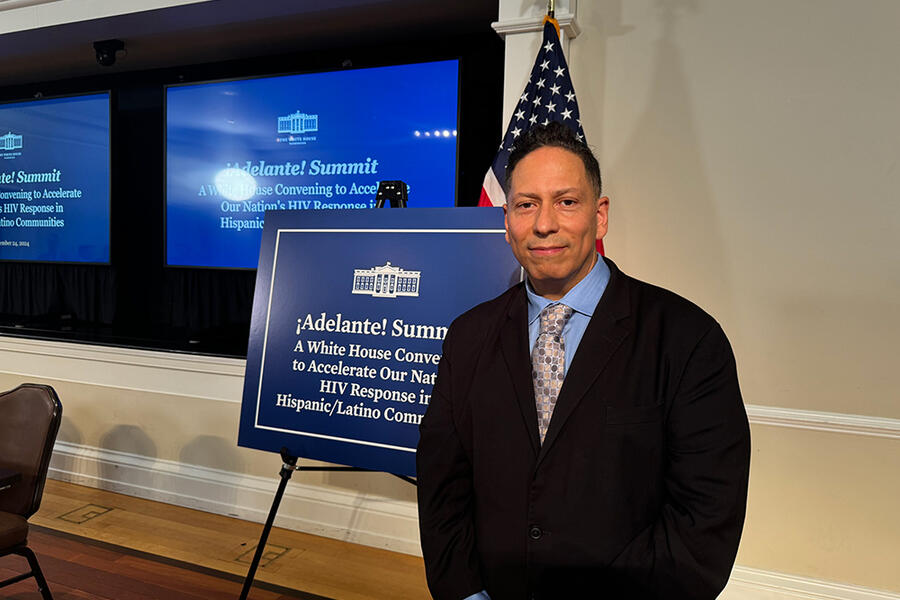Vincent Guilamo-Ramos, executive director of the Institute for Policy Solutions at Johns Hopkins School of Nursing, joined a diverse group of leaders at the White House on Tuesday to shine the spotlight on the largely invisible HIV crisis in the Latino community.
The ¡Adelante! Summit, hosted by the White House Office of National AIDS Policy, focused on amplifying diverse voices, driving tangible action, and mobilizing leadership for sustained impact. Speakers included U.S. Secretary of Health and Human Services Xavier Becerra; U.S. Rep. Barbara Lee, co-chair and co-founder of the congressional HIV/AIDS caucus; Neera Tanden, director of the White House Domestic Policy Council; Angela Hernandez; chief of the HIV Surveillance Branch at the U.S. Centers for Disease Control and Prevention; and an array of leaders at the forefront of community-driven programs and initiatives.
Guilamo-Ramos presented "Opportunities to Accelerate the National Response to Address the Ongoing U.S. Latino HIV Crisis," highlighting concerning statistics about the incidence of HIV in Latino communities and strategies for addressing it.
According to Guilamo-Ramos, from 2010 to 2022, the overall population of the United States experienced a 19% decrease in annual HIV infections; however, the Latino community's number of annual infections increased by 12%. Even more alarming, Latino men who have sex with men aged 25-34 experienced a 95% increase in annual HIV infections.
With reduced stigma around HIV/AIDS and medications like PrEP that prevent transmission of the virus, the U.S. has effective tools to fight this epidemic—which is why, for Guilamo-Ramos, HIV's current impact on Latino communities demands immediate attention.
"I wouldn't say these are disparities," Guilamo-Ramos said, "but inequities, because they are preventable, unjust, and unfair."
Such inequities are the result of federal and state policies not reaching Latino communities, an oversight emblematic of broader health care inequities in the U.S. These issues are addressed in addressed in "Ending Unequal Treatment: Strategies to Achieve Equitable Health Care and Optimal Health for All," a report published by the National Academies of Sciences, Engineering, and Medicine for which Guilamo-Ramos served on the consensus study committee.
The report makes numerous recommendations for eliminating health care inequities in the U.S., many of which can be applied to accelerating the national response to the Latino HIV crisis. This includes comprehensive care models that integrate clinical, behavioral, and social care; public health communications campaigns that are culturally and linguistically tailored to the Latino community; and evidence-based laws and policies aimed at eliminating root causes of Latino health inequities.
While the HIV inequities in the Latino community are real and warrant urgent national attention, Guilamo-Ramos also assured the room that "there's a lot to be optimistic and hopeful for." The overall tone of the event was similarly positive, with many speakers and panelists calling for the eradication of HIV/AIDS in the U.S. by 2030.
However ambitious that goal may be, Guilamo-Ramos believes it's possible as long as we invest in the Latino community. He reminded the audience that investment isn't a "zero-sum game," and that improving outcomes for Latino people will actually improve outcomes for everyone.
"The good news is that we can reverse this crisis and get even closer to a United States and world without HIV/AIDS," he said. "But we must act now."
Posted in Health, Politics+Society
Tagged hiv/aids, health equity








